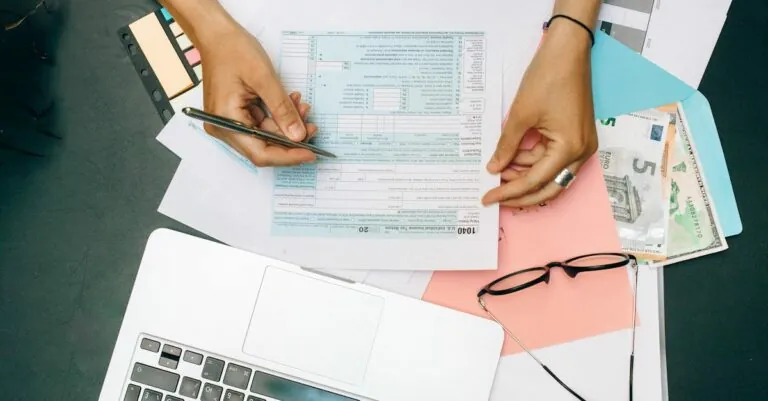Tax season can feel like a game of chess where every move counts. For savvy individuals and business owners, understanding which types of expenses can optimize tax savings is crucial. It’s not just about what you spend; it’s about how you spend it.
Imagine turning your everyday costs into powerful deductions that lighten your tax burden. Whether it’s business expenses or personal deductions, knowing the ins and outs can make a significant difference. The right strategy can transform your financial landscape, making tax time less of a headache and more of a chance to celebrate your smart choices.
Table of Contents
ToggleUnderstanding Tax Optimization
Tax optimization involves identifying and leveraging different types of expenses to maximize tax deductions. Individuals and business owners benefit by turning regular expenditures into significant tax savings. Various expense categories exist, and selecting the right ones can lead to substantial financial improvements during tax season.
Deductible expenses fall into several categories, including business-related costs, home office expenses, and education costs. Business-related costs encompass things like office supplies, employee wages, and operational expenses. Home office expenses provide deductions for space used exclusively for work, covering utilities and maintenance. Education costs can offer deductions for courses and training that enhance job-related skills.
Certain expenses hold more weight for tax optimization. Generally, business-related expenses prove to be the most advantageous due to their direct correlation with generating income. Likewise, investing in continued education often leads to professional advancement, which may yield higher future earnings.
Knowing what qualifies as a deductible expense is vital. Taxpayers must document all relevant expenses thoroughly. Receipts, invoices, and bank statements serve as evidence for the claims made on tax returns. Staying organized and maintaining clear records significantly eases the filing process and fortifies the claims made.
Considering the timing of expenses can also amplify tax benefits. Incurring expenses before the tax year ends may provide immediate deductions. Strategic planning around spending allows taxpayers to adjust their financial actions in real-time, aiming to optimize tax liabilities efficiently.
Types of Expenses for Tax Optimization
Understanding different expense types helps taxpayers maximize tax deductions effectively. Fixed and variable expenses both play unique roles in tax optimization.
Fixed Expenses
Fixed expenses represent consistent costs incurred regularly, regardless of income variations. Examples include rent, property taxes, and insurance premiums. Each of these expenses holds potential for deductions. Business owners find fixed expenses particularly advantageous, often directly linked to their commercial operations. Consistency in these costs allows for streamlined budgeting, which can facilitate better financial planning. Documentation of fixed expenses proves essential when substantiating claims on tax returns. Keeping organized records, such as payment receipts, supports justifications during audits.
Variable Expenses
Variable expenses fluctuate based on activities or usage, adapting according to specific needs. Examples include utility bills, office supplies, and travel costs. These expenses can significantly impact tax obligations since they directly correlate with business activity levels. Utilizing them strategically enhances tax savings, particularly in active business months. Tracking these expenses ensures detailed insights into spending patterns, which can inform future financial decisions. Just as with fixed expenses, proper documentation remains crucial for tax compliance and optimization, ensuring taxpayers retain necessary proofs of expenditures.
Comparing Short-Term and Long-Term Expenses
Understanding the differences between short-term and long-term expenses is crucial for effective tax optimization. Each type offers unique benefits and drawbacks in relation to tax deductions.
Benefits of Short-Term Expenses
Short-term expenses provide immediate tax deductions for taxpayers at the end of the fiscal year. Costs like office supplies and minor equipment can generate significant deductions in the current tax cycle. Quick access to benefits offers financial relief that can support cash flow management. Deducting these expenses encourages strategic spending on necessary resources. Taxpayers can refine their financial planning by taking advantage of short-term deductions.
Drawbacks of Short-Term Expenses
Short-term expenses often reflect temporary or minor investments, which may not contribute significantly to long-term growth. Deductions from these expenses could be less impactful over time compared to larger, strategic investments. Taxpayers must continuously monitor these costs, which can become cumbersome. Additionally, relying heavily on short-term expenses might limit opportunities for larger deductions in the future. Rushed spending decisions can lead to missed opportunities for more beneficial long-term expenses.
Advantages of Long-Term Expenses
Long-term expenses typically involve substantial investments like property and major equipment. These costs can lead to significant tax deductions spread over several years. Investing in these areas ensures stability and often enhances business growth potential. Additionally, claiming depreciation on long-term assets optimizes tax benefits over time. By aligning spending with long-term financial goals, taxpayers can strengthen their overall position.
Disadvantages of Long-Term Expenses
Long-term expenses require a commitment of financial resources that may hinder short-term liquidity. Initial costs can be high, which can pose risks if market conditions shift unexpectedly. Taxpayers may face challenges in managing documentation for complex assets over time. Further, while deductions are spread out, they may not provide immediate relief during tax season. Careful planning is essential, as mismanagement of these expenses could lead to tax complications in the future.
Recommendations for Tax Optimization
Taxpayers should consider prioritizing business-related expenses due to their direct correlation with income generation. Documenting these expenses meticulously can support claims on tax returns, which is essential for both individuals and business owners. Home office deductions emerge as another valuable opportunity, particularly when expenses are directly linked to a dedicated workspace.
Maintaining organized records forms the backbone of successful tax optimization. An effective method for tracking fixed expenses like rent and insurance involves keeping detailed receipts and invoices. Variable expenses, including utility bills and travel costs, require consistent monitoring to maximize potential savings.
Focusing on short-term expenses often yields immediate tax benefits but may not significantly contribute to long-term financial growth. Office supplies exemplify this category, allowing for enhanced cash flow management in the short term. On the other hand, investing in long-term expenses, such as significant capital expenditures, can result in substantial deductions over time.
Taxpayers should balance short-term expenditure with long-term investments for optimal outcomes. For instance, a strategy that blends immediate and enduring costs can stabilize financial standing while maximizing deductions. When planning expenses, timing plays a crucial role; incurring costs before the tax year closes enhances immediate deductions.
Exploring these various types of expenses leads to comprehensive tax strategies that align with overall financial objectives. Taxpayers may find that thoughtful planning, combined with strategic spending, significantly influences their tax optimization efforts. Each expense type offers unique advantages, making it vital to assess individual circumstances and spending habits carefully.
Tax optimization hinges on understanding the nuances of various expense types. Business-related expenses often stand out due to their direct impact on income generation. However both fixed and variable expenses play crucial roles in shaping a taxpayer’s overall financial strategy.
Balancing short-term and long-term expenses is essential for maximizing deductions while aligning with broader financial goals. Meticulous documentation and strategic planning empower individuals and business owners to navigate tax season with confidence. By leveraging these insights taxpayers can enhance their financial outcomes and make informed decisions that benefit their bottom line.




